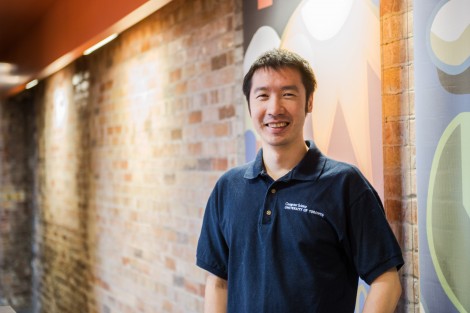The mere thought of the world beyond the comforting frame of academia is, for many students accustomed to the rhythms of university life, a fearsome one. On the cusp of graduating myself, I’m contemplating continuing on to graduate school, a decision based largely on an aversion to the nebulous possibilities of the workforce, and an idealistic, undergraduate-induced dread of becoming a company person. But there is a path somewhere between extended study and becoming an office worker; as it turns out, there are plenty of opportunities for those looking to flex their entrepreneurial muscles without straying too far from the bosom of U of T.
[pullquote]“When I was in my masters I had no real plans for the future… but all of a sudden UTEST popped up. I probably would never have considered entrepreneurship if it wasn’t for this possibility, and now with the resources we have, the funding and the space, it’s just great.”[/pullquote]
—Will Walmsley
High-touch high-tech
The Innovations & Partnerships Office at U of T collaborates with MaRS (Medical and Related Sciences) Innovation through programs like University of Toronto Early Stage Technology (utest), which aims to help members of the university community develop, launch and commercialize their business ideas. The MaRS Centre, which has long been expanding on the corner of College and Queen’s Park, is home to the eight-month old program and its first cohort of start-up software companies. The modern glass architecture of the MaRS offices is integrated into the historic façade of the original Toronto General Hospital building, located between campus and the city’s commercial areas. The program’s base is emblematic of a similar marriage between academic research and the private sector.
utest co-director Kurtis Scissons explains that he and co-director Lyssa Neel hoped to create a program “that was open enough to the broader university community,” so that they could “see everything that’s out there, and if [people] like what we offer then we can work together.” utest offers up to $30,000 in funding, access to additional financial resources, and guidance for those without any prior business experience; it seems hard not to like.
“Mostly the people who come to us have experience in technology. Once they get to a certain point they need someone who has experience in management because there’s a lot of drudgery. It’s not as exciting as the technology part, but it’s part of building a company,” says Neel. The program includes expert and legal guidance, guest speakers, and help with the day-to-day goings on of launching a business, as well as assistance in gaining government support and making the right connections.
“A lot of these things they just don’t know about, and we do, so we make introductions and it just helps them so much more than struggling on their own,” explains Scissons.
These resources are part and parcel of the program, which isn’t just about financial support. “We call this high-touch investing which means we don’t just give you the money and walk away, we are there with you every step of the way. My inventors can email me at two o’clock in the morning and get a response,” laughs Neel. “And they do,” adds Scissons.
The program is open to students of all levels, and already hosts participants with experience ranging from undergraduate degrees to faculty membership. Furthermore, it’s not restricted to computer science students. “There are lots of people in other fields who know how to program and may have had a great idea,” says Neel, “We like to think we pick winners.”
So when industrial engineering master’s student Will Walmsley’s powerful new auto-correction algorithm caught the eye of his professor, Khai Truong, they decided to take the technology to utest. Eight months into the program the two are now founders of Whirlscape, an interactive design firm with a revolutionary new range of simplified, accurate and intuitive keyboard technologies. “There’s something beautiful in the simplicity of reducing the keyboard down to just one dimension which allows us to type much faster, easily, and accurately through this really powerful auto-correction, which wasn’t possible previously,” says inventor Walmsley.
The keyboard will first reach the market in the form of an app, though it potentially has other implementations. “Because this keyboard is very simple, only one-dimensional, and you don’t have to be precise using it, you can do basically anything you could possibly imagine, and still type fast and accurately,” explains Walmsley.
Whirlscape’s narrative is not so uncommon. Tyler Lu, a PhD student in computer science, traversed a similar path when his work on decision-making caught the eye of his supervisor Craig Boutilier. Now the co-founders of Granata Decision Systems, the pair jumped into the entrepreneurial scene in 2010, before the UTEST program had been launched. Lu’s software, now geared toward marketing resource management, gained early support from the Innovations and Partnerships Office and MaRS Innovation in the commercialization process.
[pullquote]“We are one of the best research universities in the world, we should take advantage of that intellectual capital and turn it into wealth for our country and for the university.” [/pullquote]
—Tyler Lu
FROM ACADEMY TO MARKET
As for balancing the demands of running a start-up and continuing his academic research, Lu says the two fuel each other. “There’s a lot of opportunity to develop your research. You get real world problems from a start-up setting and that translates to problems you can work on in your research.”
Having made the transition from academic settings to the commercial sphere, Walmsley and Lu have no illusions about the challenges they face. “Academics, unless they’ve started a business before, are not familiar with what it takes,” admits Lu. They are cognizant, however, of the advantages of entering the commercial world the way they did. “The whole academic experience seems like a perfect bubble to put yourself in to be able to pre-incubate ideas,” says Walmsley.
The relationship is a symbiotic one, where U of T minds are buzzing around the clock and new research is conducted tirelessly. “We are one of the best research universities in the world, we should take advantage of that intellectual capital and turn it into wealth for our country and for the university,” says Lu.
Incubator programs like utest remove a lot of the hurdles and bureaucracy that impede entrepreneurs going it alone, and they offer inventors like Walmsley and Lu possibilities for their ideas that would otherwise be much more difficult and time-consuming to realize.
“When I was in my masters I had no real plans for the future,” Walmsley explains. He had casually considered travel or continuing on to a PhD, “but all of a sudden utest popped up. I probably would never have considered entrepreneurship if it wasn’t for this possibility, and now with the resources we have, the funding and the space, it’s just great.”
It doesn’t hurt either that we live in an interactive age, driven by technology. The means of production are much more democratic. “The great thing about software is that you don’t have any overhead. You could just be a person with a computer and an idea,” says Walmsley. Scissons explains, “People see stories out there of Instagram or things of that nature, and it really gets people’s hopes up that something big could happen.”
Challenges do continue to exist for the Torontonian entrepreneur though. As Lu points out, funding must be consistently acquired in order to stay afloat, and it’s often difficult to get your foot in the door with larger, older companies that are set in their ways. Lu would like to see more initiative on the part of these larger businesses to support their smaller local counterparts, and more initiatives on the part of university and the city at large to champion their own.
Students too, may be counting less and less on getting hired by companies directly out of their programs. As jobs seem to grow scarcer, people are turning to their passions, interests, and previous research to see if there might be a business idea there. “The climate has changed for people and they feel they have to make their own luck,” says Neel, “and one way to do it is if you have a great idea and you can work to build something. That’s very appealing, especially when you’re younger or a student. You don’t have to work for ‘The Man.’”
Lu also highlights the rewarding aspect of being an entrepreneur. “You get to have a significant impact on the consumers that you’re serving, the businesses that you’re serving… You feel good that you came up with a solution, and then getting to see other people use it… there’s a lot of satisfaction derived from that.”
A More Informal Fashion
There’s also space outside programs like utest for students to pursue their interests lucratively. These independent entrepreneurs often reach beyond the confines of their disciplines, while simultaneously engaging with the community on a more informal level.
Computer science student Jihan Victoria started making bags for herself after failing to find anything on the market that suited her style and budget. When her creations increasingly got noticed, she started her own bag company, Hedj. Having learned to sew by deconstructing old clothes and reworking them, Victoria’s do-it-yourself attitude has served her well. Hedj’s carefully-constructed minimalist designs have been carried by shops such as Lavish&Squalor, the now-defunct Ruins and Kensington Market favourite Pretty Freedom.
Victoria attributes some of this success to Toronto’s savvy shoppers. “I do think the environment and the mindset of the people here is especially good for arts and crafts,” says Victoria. “People here are a lot more politically conscious about what they buy. They would rather buy ethically- and locally-made products rather than sweatshop products that cost much less.”
Technology and social media play a significant role in the survival of small businesses like Hedj. Rather than forfeit 50 per cent of her revenue, as with retail consignments, or risk the hefty costs of trade shows, Victoria has switched entirely to e-commerce sites like Etsy, where she is able to reach international customers. Since moving to the web, her volume as increased as well. “Technology destroys the geographic barriers. I think it has also allowed me to have more freedom and control over my business than what people prior to Etsy’s advent had,” she says.
Though Victoria insists she’s “still winging it at this point,” she’s managed to maintain a steady small business, with her days divided pretty evenly between school and filling orders for bags, all with little direct help from U of T. Hedj was built simply by reaching out to those around her.
The passion and initiative at the core of what it means to be an entrepreneur may not always materialize in the form of a business plan. Two years ago, when undergrad Jacob Duarte Spiel decided to embrace his inner smartass and try his acerbic tongue at stand-up comedy, he didn’t know it would make him a devoted member of Toronto’s comedy scene and land him his own comedy show.
Spiel, along with childhood friend and fellow Trinity College student Alexander Saxton, were offered the chance to produce their own monthly show in the basement of the Crown and Tiger, based on the crowds they drew to their sets at the Toronto Comedy Brawl, a summer comedy competition. The two snapped up the opportunity, and the dank basement beneath the College Street watering-hole became home to The One Hour Fun Hour show. The show has since played host to comics like Scott Thompson from ’80s sketch comedy show Kids in the Hall, K. Trevor Wilson, who opened for Louis C.K. at Just for Laughs this past September, and other up and coming comedians such as Bobby Knauff and Joel Buxton.
Spiel laments the lack of independently-run shows in the city. “The ones where people have control over their own shows [are where] they take chances, [where] they can really innovate,” he says.
Comedy for Spiel is a vehicle for social discourse. He meditates on the nature of the catharsis offered through comedy, adding, “humour, satire, parody — those are the weapons of the people who don’t have power. If you can make something laughable you can take away its control over your life — sort of. But you can remind yourself that you have independence, you have agency.”
Following the show’s inception Spiel’s started contributing to online Canadian satirical newspaper, The Beaverton, and also formed the Trinity College Comedy Collective, which holds informal talks with big names in entertainment, comedy, and writing to create a dialogue with students.
Spiel admits to having trouble keeping up with his volunteer engagements now that flat fees have been instituted. He chides, “Because of the decision to institute flat fees they’ve crushed student entrepreneurship, because no one can afford to take fewer courses now in order to pursue something on the side.” Time allowing, there’s no reason why students shouldn’t seek out their interests within the community, or carve out those spaces for themselves. Spiel encourages students to do away with self-doubt and take chances.
One need only look to these examples to find entrepreneurs who have made U of T work toward their advantage, whether their projects take shape as a fully operational corporation or a rewarding side gig. According to Walmsley of Whirlscape, “An important thing when you’re going through university is not to be caught up too much in your academics for the sake of them being academics, but to keep a mind that you are learning these things for a reason… To synthesize them into new ideas.”
Check out Jihan’s bags at Hedj.






